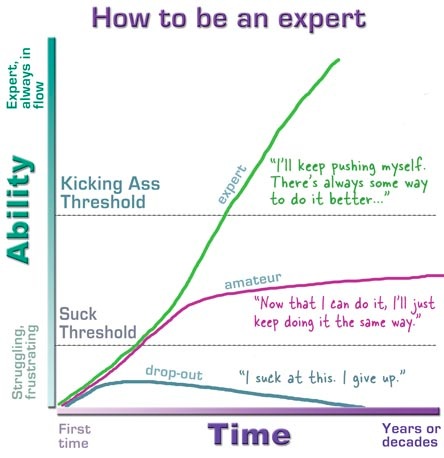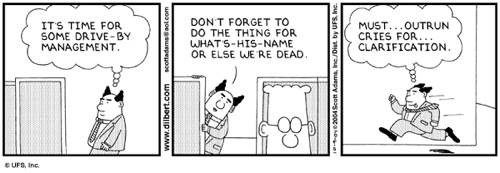Everything that’s wrong with educational management, summed up in 3 Dilbert cartoons.
Before I start, I must point out that this is not a dig at all the members of the Senior Leadership Team at my current school. Not at all. Rather, it’s a tongue-in-cheek look at the practices that traps people in management positions – at all levels – sometimes fall into. They’re therefore traps I’m going to do my best to avoid when I become part of the Senior Leadership Team at my next school!
Shiny Shiny

I’ve seen two awful presentations in the past couple of weeks. One was just monumentally bad – the presenter couldn’t find files, sat us through ages of short video clips and sprang questions at us to fill in time – and the other was just rambling and poorly thought-out. What was common to both approaches, however, was the assumption “I’m using technology therefore this must be a good presentation.” Gah.
I take the above Dilbert cartoon in the way that I think it’s meant to be read – i.e. as an extremely sarcastic and ironic look at how easily people are impressed by things that look good. That, to some extent is true. But it’s only true when accompanied by at least some level of competence in presenting information in an interesting and engaging way. Technology does not do the presentation for you!
On a slightly tangential note, I’m also concerned about the uncritical and all-too-credulous nature of otherwise intelligent people when presented with graphics that represent statistics. It’s critical literacy and a basic understanding of statistics. A grasp of these should be a pre-requisite for a career in any professional occupation…
Surfing the status quo

Hiding behind desks is something that people in management in the world over are particularly good at. In schools its especially straightforward to seem good at your job if you get the data right. Schools only have to be seen to be doing things correctly – they aren’t inspected very often, parents are often (sometimes voluntarily) left out of the everyday loop concerning their child’s interactions at school, and the status quo suits most people very well.
So if you can engineer a situation where you or your institution seem to be doing everything right, the weight of conservative opinion and social inertia are on your side. As a manager you just need to jump through the oft-renamed hoops.
What am I planning to do? Aim to be an expert. Of course, I’ll never actually achieve my goal for, in a Socratic manner, the more you know the more you realize you don’t know. Still, it’s the process that’s important – as Kathy Sierra pointed out back in the day on her much-missed blog:

Most managers are ‘amateurs’ on this graph. They find a way that works for them and then keep on doing it. Over time, this means inconveniencing others and distorting things to make things fit into their system.
Those who choose the ‘expert’ path and challenge themselves to keep learning become – perhaps inadvertently – leaders, as the enthusiasm for continuous learning and their own professional development attracts others like a magnet!
‘Drive-by’ management

One of the results of being an ‘average’ manager (see above) is that, by not challenging yourself to learn new things, you will have spare time. Feeling guilty about this, managers then want to make sure they look like they’re doing their job and have authority. They therefore make things up for people to do, are awkward just for the sake of it, or ‘drop-in’ on people and point out irrelevancies.
I’m going to take as a fundamental maxim that people should be trusted to be professionals and get on with their job. Yes, there should be as much appropriate communication as possible, but attempts to micro-manage and meddle usually backfire. I suppose you could say that’s a fairly laid-back approach. Fair enough, but I’ll be demanding results! I think people will respect that. 🙂
What do YOU find wrong with management in education? Share your opinions in the comments section below!

![Reblog this post [with Zemanta]](http://img.zemanta.com/reblog_e.png?x-id=07329a25-1442-4b6b-9800-76c7669ccbb8)
 I mentioned the above quotation in a
I mentioned the above quotation in a ![Reblog this post [with Zemanta]](http://img.zemanta.com/reblog_e.png?x-id=bdd8b8ab-7e11-4603-a4f1-e0efce03fa85)